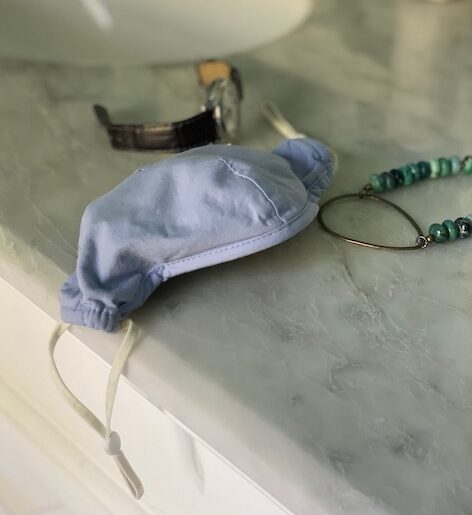We’re now seven months or so into this pandemic, and I am trying to make intelligent decisions.
In spite of being what I would consider a reasonably intelligent person, however, I’m finding this difficult.
On the one hand, COVID infections are at record highs, and winter is probably going to be exponentially worse. We know the ingredients for relative safety and that most of the things we want to do aren’t great ideas. On the other hand, COVID death rates are declining, and Indiana has fully re-opened. Also, I’m very tired of this.
And, you know, I see everyone else being tired of this, and here’s the truth: that messes with my judgment. Every time I see people eating chicken wings in close proximity to each other, a little piece of my critical thinking flakes off and whirls away into the breeze.
How bad can it be? I think. All those people are sitting in there and they’re not dead.
Or, when considering the relative danger of nearly any activity, restaurant-related or no, my thoughts go something like this:
Oh, that’s risky and I shouldn’t go.
But the kids have been in school for ten weeks and we’re still alive.
But if everyone thinks that, we’ll be right back where we were in March.
BUT maybe I would rather risk my own death than never go out and do things again.
BUT ALSO I’m putting other people at risk.
BUT ALSO ALL THOSE OTHER PEOPLE are doing it.
BUT ALSO CONAN HASN’T HAD A HAIRCUT SINCE MARCH and surely I can do without this frivolous activity for a few more months.
NO. I CHOOSE DEATH.
….I shouldn’t go.
I wrote about this when we started wearing masks, but I find I’m struggling anew. My logic is maddeningly inconsistent; what seemed absolute to me one week inhabits a COVID-y shade of gray the next. It’s pandemic fatigue, for sure, but it’s also all those other weird things about our psyches that make humans really, really bad at making decisions.
In my defense and yours, let’s talk about risk perception for a minute. Regardless of our intelligence, we’re not great at measuring how dangerous things are. There are approximately five hundred million reasons for this, but I’ve noticed three working on me personally these past couple of months.
So, the first problem is trust. Risk perception is influenced by many factors, but a biggie is how trustworthy we perceive the person or organization warning us about the risks to be. I don’t have to tell you that where COVID is concerned, we have some slight issues with trust. Americans’ trust in government has been declining since the ’70s anyway, and in the past four years we’ve been given pretty good reason to believe the collective pants of the executive branch are nearly always ablaze.
This has been a cognitive tightrope for me. I believe in scientists. I trust people doing research for peer-reviewed journals and universities and the public good. And I want SO badly to trust government regulatory agencies because anarchy is bad, kids. The dissolution of public trust is dangerous and leaves us vulnerable to things like, you know, contesting valid election results. I also know, however, that the CDC has been strongarmed by this administration, and I have no way of knowing how much that has or continues to have an effect on the COVID numbers it presents.
So there’s that.
Second, all of us have a comparative optimism problem. This is the tendency of humans to assume that negative outcomes are things that happen to other people, not themselves.
We all think we’re going to get a mild case of COVID, right?
You know, though, give yourself a break on this one. We have to detach from the reality of uncontrollable death in order to get up and function. If you don’t drop this knowledge like it’s hot (or attain enlightenment and become one with it…but you know, odds are low), you’ll spend your days not at work or school, but perhaps in the fetal position, or making anxiety sculptures out of your mashed potatoes.
We’re not going to get rid of comparative optimism. However, I think it’s good to at least be aware of it. I know my ruminations on death by volcano or murder hornets do not make me above this tendency. The problem is more with the mundane stuff: the produce I should wash, the thunderstorm I shouldn’t shower during, the birthday party full of people I assume all tested negative. I need a little Post-It over my prefrontal cortext for all things COVID: Note to self: you’re not invincible.
Similarly, and finally, there’s habituated action theory. We downplay the risks of things we do often, especially if we’ve managed to do them often without ending up in the hospital. It’s why we’re all still texting and driving. Every time you send a text and do not go careening off a cliff, your belief in your own singular identity as an elbow-driving god is cemented.
This has made reopening schools has been a bit judgment-numbing for me. My kids have been exposed to other people all day every day for several weeks, and since disaster hasn’t struck, it’s easy for me—consciously or unconsciously—to write off the risks of everything else we do.
Same for my slow but steady venture back out into society. I mostly did not leave my house from March to June (it wasn’t exactly a hardship), and so my early summer trips to the grocery were filled with panic and sanitizing wipes. Every trip that didn’t result in symptoms, however (and how would I even know if that’s WHERE THE SYMPTOMS CAME FROM ANYWAY, which is a whole other cognitive infinity loop) turned down the panic dials in my brain, for better or worse.
This is hard, is what I’m saying. And there are SO many other decision gremlins banging wrenches against my brain, including the lag time between infection and symptoms, the way COVID superiority feeds my delicate ego, the importance of supporting local businesses, and the need for human interaction, but writing about all of them is almost as insanity-making as thinking all of them.
I haven’t made perfect decisions since March, and as I sit here today in October, I’m still not sure what the perfect decisions even are. But I’m giving myself some grace, because being a person and making perfect decisions don’t really go together. I’m going to keep wearing a mask (duh), washing my hands (DUH), talking to friends outside, and ordering everything I can online. For everything else, the gremlins and I are just going to have to battle it out.
Wish me luck.



1 comment
Comments are closed.